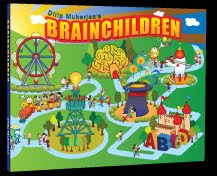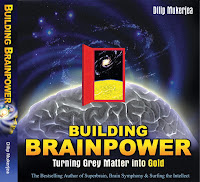 While browsing the Amazon online catalog, I came across a book entitled 'Golfing with Your Eyes Closed: Mastering Visualization Techniques for Exceptional Golf', by two sports science enthusiasts Erin Macy & Tiffany Wilding-White.
While browsing the Amazon online catalog, I came across a book entitled 'Golfing with Your Eyes Closed: Mastering Visualization Techniques for Exceptional Golf', by two sports science enthusiasts Erin Macy & Tiffany Wilding-White.One tag line caught my personal attention:
"The body achieves what the mind believes."
Also, as I grokked through some of the pages, an anecdote from the great golfer of all time Jack Nicklaus astutely summed up the essence of the book's contents:
"I never hit a shot, not even in practice, without having a very sharp, in-focus picture of it in my head. It's like a color movie. First, I see the ball where I want it to finish, nice and white and sitting up high on the bright green grass. Then the scene quickly changes and I "see" the ball going there: its path, trajectory, and shape, even its behavior on landing. Then there's sort of a fade-out, and the next scene shows me making the kind of swing that will turn the previous images into reality. Only at the end of this short, private, Hollywood spectacular do I select a club and step up to the ball."
I had often used the foregoing anecdote in my peak performance training workshops during the early years to help illustate the power of creative visualisation & mental rehearsal, besides drawing upon my own personal experiences.
[My first exposure to the mindfulness practices actually dates back to the late eighties, when I had attended one of the 'Alpha Dynamics' weekend retreats.
Readers can go to this link in my 'Optimum Performance Technologies' weblog to read about one of my real-world applications, which was featured in the local 'Business Times' during the nineties.]
In fact, I also like to share with readers two other inspiring anecdotes:
One came from master motivator Zig Ziglar, who had first mentioned about it in his book, 'See You at The Top', during the seventies or so.
Major James Nesmeth had spent seven years as a prisoner of war in North Vietnam. During those seven years, he was imprisoned in a cage that was approximately four and one-half feet high and five long.
[Just try to recall the Vietnam War movie, 'Hanoi Hilton', to get the picture.]
During almost the entire time he was imprisoned he saw no one, talked to no one and experience no physical activity. In order to keep his sanity and his mind active, he used the art of visualisation.
Everyday in his mind, he would play a game of golf. A full 18-hole game at his favourite green.
In his mind, he would create the trees, the smell of the freshly trimmed grass, the wind, the songs of the birds. He created different weather conditions – windy spring days, overcast winter days and sunny summer mornings.
He felt the grip of the club in his hands as he played his shots in his mind. The set-up, the down-swing and the follow-through on each shot. Watched the ball arc down the fairway and land at the exact spot he had selected. All in his mind.
He did this seven days a week. Four hours a day. Eighteen holes. Seven years.
When Major Nesmeth was finally released, he found that he had cut 20 strokes off his golfing average without having touched a golf club in seven years.
Appended below is another inspiring anecdote, from peak performance consultant Charles Garfield, who wrote the two classics during the late eighties, 'Peak Performers' & 'Peak Performance':
 In 1959, the world-class Chinese pianist Liu Chi Kung - he had won the second prize in the Tchaikovsky Piano Competition in Vienna just one year earlier - was imprisoned during the Cultural Revolution, during which time he had no access to a piano.
In 1959, the world-class Chinese pianist Liu Chi Kung - he had won the second prize in the Tchaikovsky Piano Competition in Vienna just one year earlier - was imprisoned during the Cultural Revolution, during which time he had no access to a piano.Worst still, he was all alone in a cell for seven years.
When he was released, he almost immediately played a series of highly acclaimed concerts. The public was amazed that none of his virtuosity had been lost, despite seven years without a piano.
When asked how he had retained such a high level of skill with no piano to practice on, he replied:
“I did practice every day. I rehearsed every piece I had ever played, note by note, in my mind.”
In summing up, I like to quote psychologist William James who once said:
"There's a law in psychology that if you form a picture in your mind of what you would like to be, and you keep and hold that picture long enough, you will soon become exactly what you are thinking."
A word of caution, though, just in case you may get carried away:
According to peak performance consultant Don Greene, writing in 'Performance Success: Performing Your Best Under Pressure':
There are 7 essential skills for optimal performance on the track, court, links or slopes:
1) Determination;
2) Poise;
3) Mental Outlook;
4) Emotional Appraisal;
5) Attention;
6) Concentration;
7) Resilience;
















No comments:
Post a Comment